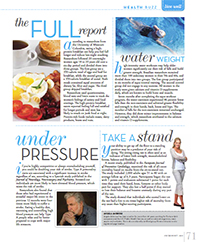Skip to content
Health Buzz
 Eating a high protein breakfast can help you feel full longer and reduce late-night snacking, according to researchers from the University of Missouri-Columbia. They followed 20 overweight women between 18 and 20 years old over a six-day period and divided them into three groups. The first group ate a 350-calorie meal of eggs and beef for breakfast. The second group ate a 350-calorie breakfast of cereal. Both meals contained equal amounts of dietary fat, fiber and sugar. The third group skipped breakfast. Researchers used questionnaires, blood tests and brain scans to track the women’s feelings of satiety and food cravings. The high-protein breakfast eaters reported feeling full and satisfied for longer periods and were less likely to snack on junk food at night. Protein-rich foods include meats, dairy products, beans and nuts.
Eating a high protein breakfast can help you feel full longer and reduce late-night snacking, according to researchers from the University of Missouri-Columbia. They followed 20 overweight women between 18 and 20 years old over a six-day period and divided them into three groups. The first group ate a 350-calorie meal of eggs and beef for breakfast. The second group ate a 350-calorie breakfast of cereal. Both meals contained equal amounts of dietary fat, fiber and sugar. The third group skipped breakfast. Researchers used questionnaires, blood tests and brain scans to track the women’s feelings of satiety and food cravings. The high-protein breakfast eaters reported feeling full and satisfied for longer periods and were less likely to snack on junk food at night. Protein-rich foods include meats, dairy products, beans and nuts.- High-intensity water workouts may help older women significantly cut their risk of falls and build greater strength. Brazilian researchers recruited more than 100 sedentary women in their 50s and 60s and divided them into two groups. The first group participated in six months of aqua interval training. The second control group did not engage in any exercise. All women in the study were given calcium and vitamin D supplements daily, which are known to build bone and muscle. Seven months after completing the aqua workout program, the water exercisers experienced 86 percent fewer falls than the non-exercisers and achieved greater flexibility and strength in their hands, back, knees and hips. The number of falls for the non-exercisers remained unchanged. However, they did show minor improvements in balance and strength, which researchers attributed to the calcium and vitamin D supplements.
- If you’re highly competitive or always overscheduling yourself, you could be doubling your risk of stroke. Type A personality traits are associated with a significant increase in stroke regardless of gender, according to a Spanish study published in the Journal of Neurology, Neurosurgery and Psychiatry. Stressed-out individuals are more likely to have elevated blood pressure, which raises the risk of stroke. Researchers also found that those who had experienced a stressful major life event in the previous 12 months were four times more likely to suffer a stroke. Eating a healthy diet, exercising and controlling high blood pressure can help Type A people relax and be better prepared to cope with major life stressors.
- Your ability to get up off the floor to a standing position may be a predictor of your risk of dying. The sitting-rising test is often used as an indicator of lower limb strength, musculoskeletal fitness, balance and flexibility. A recent study, published in the European Journal of Preventive Cardiology, examined the risk of all-cause mortality based on results from the sit-to-stand test. The study included 2,000 adults aged 51 to 80 with an average follow up of 6.3 years. Participants began the test with five points and evaluators subtracted one point for each time they used their hand, knee, forearm or other body part for support. They also lost a half point if they started to lose their balance and became unsteady during any part of the test. The study showed that individuals who scored lower on the test had a five to six times higher risk of mortality from any cause than higher-scoring participants.
Published in Prime Living
 Eating a high protein breakfast can help you feel full longer and reduce late-night snacking, according to researchers from the University of Missouri-Columbia. They followed 20 overweight women between 18 and 20 years old over a six-day period and divided them into three groups. The first group ate a 350-calorie meal of eggs and beef for breakfast. The second group ate a 350-calorie breakfast of cereal. Both meals contained equal amounts of dietary fat, fiber and sugar. The third group skipped breakfast. Researchers used questionnaires, blood tests and brain scans to track the women’s feelings of satiety and food cravings. The high-protein breakfast eaters reported feeling full and satisfied for longer periods and were less likely to snack on junk food at night. Protein-rich foods include meats, dairy products, beans and nuts.
Eating a high protein breakfast can help you feel full longer and reduce late-night snacking, according to researchers from the University of Missouri-Columbia. They followed 20 overweight women between 18 and 20 years old over a six-day period and divided them into three groups. The first group ate a 350-calorie meal of eggs and beef for breakfast. The second group ate a 350-calorie breakfast of cereal. Both meals contained equal amounts of dietary fat, fiber and sugar. The third group skipped breakfast. Researchers used questionnaires, blood tests and brain scans to track the women’s feelings of satiety and food cravings. The high-protein breakfast eaters reported feeling full and satisfied for longer periods and were less likely to snack on junk food at night. Protein-rich foods include meats, dairy products, beans and nuts.